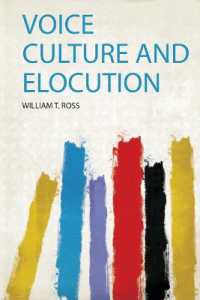- ホーム
- > 洋書
- > ドイツ書
- > Humanities, Arts & Music
- > Psychology
- > practical psychology
基本説明
New in paperback. Hardcover was published in 2004. What are the various forms of psychological coercion? When and to whom is it applied? What effect does it have on the truly innocent suspect?
Full Description
What forms of psychological coercion are involved in interrogation? Are some people more susceptible to falsely confessing than others? What are the effects of psychological manipulation on innocent suspects? Are coercive tactics ever justified with minors? This book answers these questions.








